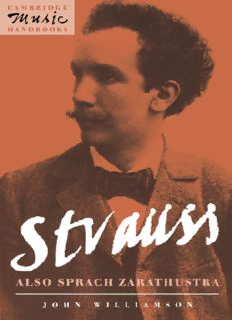
Strauss: Also sprach Zarathustra PDF
Preview Strauss: Also sprach Zarathustra
CAMBRIDGE MUSIC HANDBOOKS Strauss: Also sprach Zarathustra CAMBRIDGE MUSIC HANDBOOKS GENERAL EDITOR Julian Rushton Cambridge Music Handbooks provide accessible introductions to major musical works, written by the most informed commentators in the field. With the concert-goer, performer and student in mind, the books present essential information on the historical and musical context, the composition, and the performance and reception history of each work, or group of works, as well as critical discussion of the music. Other published titles Bach: Mass in B Minor JOHN BUTT Beethoven: Missa solemnis WILLIAM DRABKIN Beethoven: Symphony No. 9 NICHOLAS COOK Berg: Violin Concerto ANTHONY POPLE Chopin: The Four Ballades JIM SAMSON Handel: Messiah DONALD BURROWS Haydn: The Creation NICHOLAS TEMPERLEY Haydn: String Quartets, Op. 50 w. DEAN SUTCLIFFE Janacek: Glagolitic Mass PAUL WINGFIELD Mahler: Symphony No. 3 PETER FRANKLIN Musorgsky: Pictures at an Exhibition MICHAEL RUSS Schoenberg: Pierrot lunaire JONATHAN DUNSBY Schubert: Die schbne Miillerin SUSAN YOUENS Schumann: Fantasie, Op. 17 NICHOLAS MARSTON Sibelius: Symphony No. 5 JAMES HEPOKOSKI Strauss: Also sprach Zarathustra John Williamson University of Liverpool CAMBRIDGE UNIVERSITY PRESS Published by the Press Syndicate of the University of Cambridge The Pitt Building, Trumpington Street, Cambridge CB2 1RP 40 West 20th Street, New York, NY 10011-4211, USA 10 Stamford Road, Oakleigh, Melbourne 3166, Australia © Cambridge University Press 1993 First published 1993 A cataloguing in publication record for this book is available from the British Library Library of Congress cataloguing in publication data Williamson, John. Strauss: Also sprach Zarathustra / John Williamson p. cm. - (Cambridge music handbooks) Includes bibliographical references and index. ISBN 0 521 40076 7. - ISBN 0 521 40935 7 (pbk) 1. Strauss, Richard, 1864-1949. Also sprach Zarathustra. I. Title. II. Series. ML410.S93W55 1993 784.2'184-dc20 92-20457 CIP MN ISBN 0 521 40076 7 hardback ISBN 0 521 40935 7 paperback Transferred to digital printing 2004 AH for Roger and Eleanor Contents Acknowledgements page ix Abbreviations x 1 'Freely after Nietzsche' 1 2 The Straussian tone poem as drama 10 The Lisztian symphonic poem and mythic symbols 11 Strauss and the mythic in Nietzsche's Zarathustra 12 Ritter, Strauss and the poetic 13 The symphonic poem as character sketch; the tone poem as drama 16 3 Strauss's individualism 20 Strauss and anarchist individualism 22 Nietzsche's concept of the individual 25 The individual and the evolution of the Superman 27 The Eternal Recurrence as affirmation of life 28 4 Composition and first performances 31 5 Reception 39 Programme music and its antagonists 39 Naturalism and Impressionism 44 Zarathustra in France: Romain Rolland and 'Neroism' 46 Reappraisal: from Superman to science fiction 49 vn Contents 6 Narratives 54 The tone poem as Nietzschean narrative 54 Harm's evolutionary narrative 64 Strauss as Zarathustra 67 7 Structures 70 Strauss and the leitmotif 70 Symphonic characteristics oi Also sprach Zarathustra 75 Variation, metamorphosis and variant 84 8 Rhetoric U 9 Afterword 107 Notes 110 Bibliography 118 Index 122 Vlll Acknowledgements At least one reviewer of earlier titles in this series has claimed that it is specifically devoted to 'musical masterpieces'. Also sprach Zarathustra may sit a little awkwardly in such company, since its mastery is hardly uncontested; nor is it necessarily the most popular of Strauss's tone poems. A handbook about it runs the risk of being at least as much a study of a 'case' as of a masterpiece. I have not avoided the former aspect, for Zarathustra has its place in several discussions, about programme music, about theories of form, and about the nature of tonality in the late nineteenth century. Perhaps when such debates are finally understood in their full complexity, the 'mastery' of Zarathustra will be settled one way or the other. That it is of great importance in Strauss's development is hardly to be questioned. Ultimately, Zarathustra seems worthy of study for its place in the whole area of 'words and music', and for the manner in which it has overcome critical hostility to win new audiences in the last quarter of a century. Of the various people who have contributed to this book, I should like to thank Dr Franz Trenner and Dr Robert Miinster of the Bayerische Staatsbibliothek, who made it possible for me to examine photocopies of Strauss's sketches for Zarathustra. Dr Eveline Nikkels kindly sent me a copy of an as yet unpublished article on Strauss and Nietzsche. Julian Rushton provided numerous valuable suggestions and encouragements, and Penny Souster also was invaluable in urging me on to complete the book. Traditionally at this point one thanks also one's family; in the present case two of them insisted that the book be dedicated to them. Extracts from Also sprach Zarathustra, © 1896 by Josef Aibl Musikverlag, © 1932 assigned to C. F. Peters, are reproduced by permission of Peters Edition Ltd., London. IX
Description: